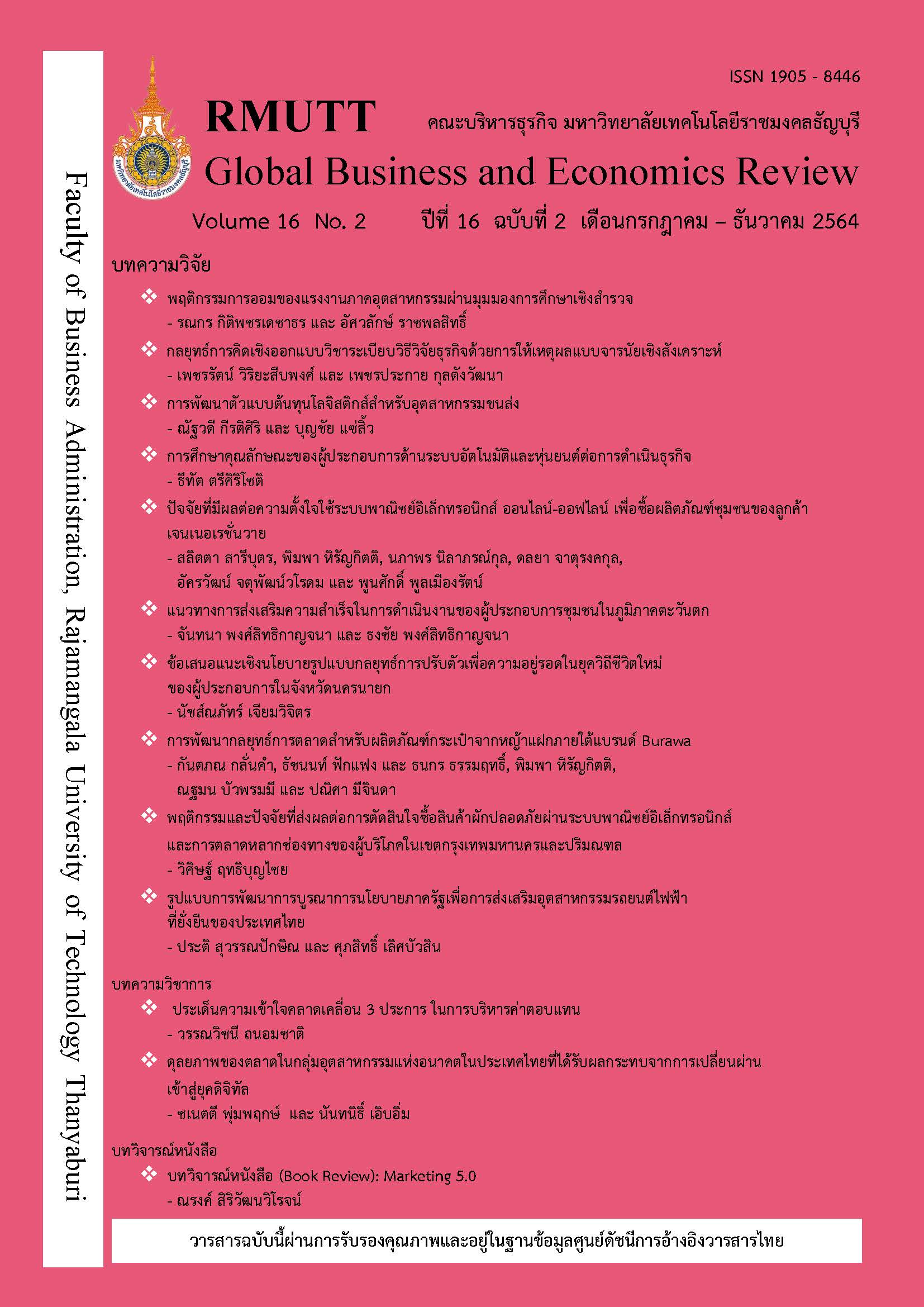THE DEVELOPMENT MODEL FOR INTEGRATING GOVERNMENT POLICIES TO PROMOTE THE ELECTRIC VEHICLE INDUSTRY SUSTAINABILITY OF THAILAND
Keywords:
Industrial Promotion, Government Policy, Electric Vehicle IndustryAbstract
This research aimed to study (1) Government policies that promote and support the electric vehicle industry, and (2) To develop a model for integrating government policies promotion of sustainable Electric Vehicle Industry in Thailand. This is a qualitative research by in-depth interviews with executives from government agencies and the private sector to find ways to support policies more effectively. The results showed as below. (1) Government policy that promotes and supports the electric vehicle industry is a good policy that will promote the widespread use of electric cars in Thailand but there must be more clarity to promote. (2) Develop a model for integrating government policies to promote the sustainable electric vehicle industry in Thailand to become successful Government policies should be clear, a time frame for promotion must be established and the performance must be continuously monitored.
References
กระทรวงพลังงาน. (2561). นโยบายกาสนับสนุนและการส่งเสริมด้านอุตสาหกรรมรถยนต์ไฟฟ้า. สืบค้นจาก https://energy.go.th/2015/author/posts/
กระทรวงอุตสาหกรรม. (2561). มาตรการสนับสนุนการผลิตรถยนต์ที่ขับเคลื่อนด้วยพลังงานไฟฟ้าในประเทศไทย. สืบค้นจาก https://media.thaigov.go.th/uploads/document/124/2017/03/pdf/%E0%B8%82%E0%B9%89%E0%B8%AD%E0%B9%80%E0%B8%AA%E0%B8%99%E0%B8%AD%20EV%20%E0%B8%AD%E0%B8%81.-V3.pdf
การไฟฟ้านครหลวง. (2561). การเตรียมความพร้อมด้านโครงสร้างพื้นฐานเพื่อส่งเสริมการใช้รถยนต์ไฟฟ้า. สืบค้นจาก https://www.mea.or.th/content/detail/87/4015
นงเยาว์ เอียดตรง. (2543). การวิเคราะห์หลักสูตรสู่แผนการจัดกิจกรรมการเรียนรู้แบบบูรณาการทุกกลุ่มประสบการณ์ ระดับประถมศึกษาปี่ที่ 5-6. กรุงเทพฯ: เดอะมาสเตอร์กรุ๊ปแมเน้จเม้นท์.
วินัย ภู่ประชาตระกูล. (2560). ยุทธศาสตร์การบริหารแบบบูรณาการด้านการท่องเที่ยวขององค์การบริหารส่วนจังหวัด 3 จังหวัดภาคใต้: ศึกษากรณีจังหวัดสุราษฎร์ธานี นครศรีธรรมราชและกระบี่. (วิทยานิพนธ์ปริญญาดุษฎีบัณฑิต, มหาวิทยาลัยราชภัฎสวนดุสิต).
ศูนย์วิจัยกสิกรไทย. (2560). ยุคยานยนต์ไฟฟ้ามาแรง หนุน SME ไทยรุ่ง. สืบค้นจาก https://kasikornbank.com/th/business/sme/KSMEKnowledge/article/KSM EAnalysis/Pages/Electric-Vehicle.aspx
สถาบันยานยนต์. (2555). แผนแม่บทอุตสาหกรรมยานยนต์ ปี พ.ศ. 2555 – 2559. สืบค้นจาก http://www.thaiauto.or.th/2012/th/research/research-detail.asp?rsh_id=39
สำนักงานนโยบายและแผนพลังงาน. (2559). รายงานแผนพัฒนาโครงสร้างพื้นด้านไฟฟ้าเพื่อรองรับยานยนต์ไฟฟ้าของประเทศไทย. สืบค้นจาก http://www.eppo.go.th/images/Infromation_service/studyreport/EV_plan.pdf
สำนักงานเศรษฐกิจอุตสาหกรรม. (2559). ยุทธศาสตร์การพัฒนาอุตสาหกรรมไทย 4.0 ระยะ 20 ปี (พ.ศ. 2560 - 2579). สืบค้นจาก http://www.oie.go.th/assets/portals/1/fileups/2/files/Industrial%20Master%20Plan/thailandindustrialdevelopmentstrategy4.0.pdf
Beare, D. (2012). Will electric vehicles be a burden or benefit for Ontario’s aging power grid. Canada: Faculty of The Environment, University of Waterloo.
Gong, H., Wang, M., & Wanf, H. (2012). New energy vehicles in china: a policies, demonstration, and progress. Mitigation and Adaptation Strategies for Global Change, 19(2), 1-22.
Guest, G. (2006). How many interviews are enough? an experiment with data saturation and variability. Sage journals, 18(1), 59-82.
Ohlsson, M. (2014). A new era for transportation in Europe. Sweden: Faculty of Engineering. Sweden: University of Gothenburg.
MRes, C. M. (2009). Assessing transition policies for the diffusion of electric vehicles. Uk: Department of Earth Science and Engineering, Imperial College London.
Slowik, P., & Lutsey, N. (2018). The continued transition to electric vehicles in U.S. cities. USA.: The International Council on Clean Transportation.
Downloads
Published
How to Cite
Issue
Section
License
The articles published in this journal are the intellectual property of their respective authors.
The views and opinions expressed in each article are solely those of the individual authors and do not reflect the positions of Rajamangala University of Technology Thanyaburi or any of its faculty members. All components and content of each article are the sole responsibility of the respective authors. In the event of any errors, the authors shall bear full responsibility for their own work.








